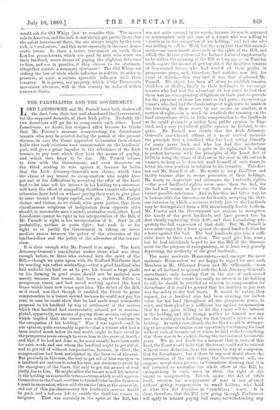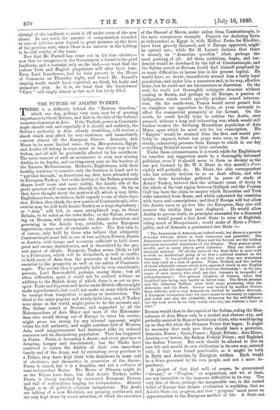THE PARNELLITES AND TIIE GOVERNMENT.
LORD LANSDOWNE and Mr. Parnell have both shaken off the dust from their feet and abandoned the Government, for the supposed demerits of their Irish policy. Probably the two desertions will go far to compensate each other. Lord Lansdowne, no doubt, has resigned office because lie thinks that Mr. Forster's measure compensating for disturbance tenants who may be evicted during the period of the present distress, in case the Court appointed to examine their claims holds that such evictions were unreasonable on the landlords' part, will give a great impulse to the reluctance of the Irish tenants to pay rent which they have the means of paying,
and which they know to be due. Mr. Parnell refuses to vote with the Government, and even threatens on the third reading to vote against it, because he holds that the Lish Attorney-General's new clause, which bars the claim of any tenant to compensation who might have got out of his difficulties by accepting the offer of the land- lord to let him sell his interest in his holding to a successor, will have the effect of compelling thriftless tenants who might otherwise have held on without paying their rent, to give place to some tenant of larger capital, and go. Now, Mr. Forster claims, and claims, as we think, with great justice, that these simultaneous eruptions of indignation from opposite sides should, in reasonable men's minds, neutralise each other. Lord Lansdowne cannot be right in his interpretation of the Bill, if Mr. Parnell is right in his interpretation of it. And in all probability, neither is quite right.; but each is so far right as to justify the Government in taking an inter- mediate course between the policy of the advocates of the landlord-class and the policy of the advocates of the tenant- class.
It is clear enough why Mr. Parnell is so angry. The Irish Attorney-General's amendment makes clear, what was clear enough before, to those who entered into the spirit of the Bill,—though we quite agree with Sir Stafford Northcote that its wording was rather misleading,—that a good landlord who had underlet his land so as to give his tenant a large profit on his farming in good years, should not be mulcted now merely because that tenant had been a thriftless fellow in prosperous times, and had saved nothing against the hard times which have now come upon him. The defect of the Bill. as it stood, was that though it enabled the Court to grant compensation to a tenant ejected because he could not pay his rent, in case he could show that he had made some reasonable proposal to his landlord by way of settlement of the arrears which that landlord had unreasonably refused, yet it contern- plated, apparently,no means of paying these arrears, except one which implied that the tenant was willing to "continue in the occupation of his holding." Now it was argued—and, in our opinion, quite reasonably argued—that a tenant who had a farm rented much below its real worth ought to have saved in the prosperous years enough to cover him in the years of dearth ; and that if he had not done so, he must usually have been unfit for such work, and one whom the landlord ought to get rid of, and to get rid of without compensation, because, in effect, the -compensation had been anticipated by the lowness of the rent. But precisely in this case, the way to get rid of him was open to a landlord not anxious to raise his rent, not desirous to profit by the emergency of the times, bat only to get the arrears of rent justly due to him. He might allow the tenant to sell his interest
in the holding on reasonable terms,—terms which would approve themselves to the Court,—either to himself (the landlord) or to a
ts nant in succession, whowJuld obtain the farm at the same rent; and out of this purchase-money the landlord's arrears would be paid, and a balince left to enable the thriftless tenant to emigrate. That was certainly in the spirit of the Bill, but was not quite covered by its words, because its words appeared to contemplate only the case of a tenant who was willing to "continue in the occupation of his holding," and not one who was willing to sell it. Well, but the very fact that this amend- ment,—an amendment absolutely in the spirit of the Bill, and
which the Attorney-General for Ireland declared emphatically to be within the meaning of the Bill as long ago as on Tuesday week,—gave the means of getting rid of the thriftless tenants of low-rented farms, who bad wasted all their profits in prosperous years, and, therefore, had nothing now left for years of dearth,—this very fact it was that displeased Mr. Parnell. His object has been all along to establish tenants, thriftless or thrifty, firmly in their holdings ; to encourage tenants who had had the advantage of low rents, to feel that there was no corresponding obligation on their part to provide for the payment of those low rents in bad years ; to encour ige tenants who had had the disadvantage of high rents to insist on the lowering of those rents, by one means or another, as a matter of right,—in a word, to establish the tenantry rn the land everywhere, with as little compensation to the landlords as he could persuade a rather hazy public opinion in Eng- land, and a very prejudiced public opinion in Ireland, to re- quire. Mr. Parnell sees clearly that the Irish Attorney- General's amendment affirms at a most critical moment the principle that a landlord who has bem acting liberally for many years back, and who has had the misfortune to have a thriftless tenant, is quite in his right, and is acting in perfect harmony with the principles of the Land Act of 1870, in using the times of distress as the sieve to sift out such tenants, so long as he does not avail himself of such times to. better his own position in relation to his tenantry. This does not suit Mr. Parnell at all. He wants to keep thriftless and thrifty tenants alike in secure possession of their holdings. He wants to depreciate and attenuate the landlords' rights, —the good landlords' rights, even more than the bad, for the bad will sooner or later cut their own throats,—to the lowest possible minimum. And in his thin and bitter way, he is furious with the Governurmt for frankly accepting the obvi- ous criterion by which a measure strictly just to the landlords may be distinguished from a Bill intentionally hostile to them. Mr. Forster and the Government are anxious to strengthen the hands of the good landlords, and have proved this by first clearly explaining their drift, and then formulating ade- quately the full expression of that drift. But Mr. Parnell is even more eager for a lever against the good landlords than for a lever against the bad. The bad landlords give him a suffi- cient lever by their own action. The good give him none ; but he had mistakenly hoped to use this Bill of the Govern- ment for the purpose of extinguishing, or at least very gravely depressing, the authority of the good landlords.
The more moderate Home-rulers,--and amongst the more moderate Home-rulers we are happy to regard for once such Members as Mr. O'Connor Power and Mr. O'Donnell,—were not at all inclined to quarrel with the Irish Attorney-General's amendment, only insisting that in the ease of rack-rented tenants, where the tenant has really no interest in the holding to sell, he should be entitled on eviction to compensation for disturbance if it could be proved that his inability to pay rent was due solely to the bad times. It would be unfair, they argued, for a landlord who had been exacting the fullest value for his land throughout all the prosperous years, to evict, and then plead as a sufficient bar against compensation that he was quite willing to let the tenant sell his interest in the holding, and this though neither he himself nor any one else would give a farthing for that tenant's interest in his holding. In such a case, clearly the landlord would be attempt- ing to use a timcof famine as an opportunity for cleating his land without cost, of tenants out of whom he had sucked everything that there was to be sucked, during the succession of favourable years. We do not doubt for a moment that in cases of this kind, the Court would bold that the tenant could not be evicted
without some deduction from the arrears by way of compensa-
tion for disturbance ; but if there be any real doubt about the interpretation of the new clause, the Government will, we suppose, accept some proviso in Committee showing that it is not intended to neutralise the whole effect of the Bill, by extinguishing in such cases as these, the right of the tenant to compensation. Indeed, under the Act of 1870 itself, eviction for non-payment of rent is not allowed without giving compensation to small holders, who held
at what the Act describes as " exorbitant " rents. It is clear, therefore, that the Bill now going through Parliament will apply to tenants paying full rents, notwithstanding any
attempt of the landlords to stave it off under cover of the new clause. In one word, the amount of compensation awarded in case of eviction must depend in great measure on the level of the previous rent, where there is no interest in the holding to be sold worthy of the name.
Now that Mr. Parnell has come out in his true colours,— now that he recognises in the Government a friend to the good landlords, and a restraint only on the bad,—we trust that the jealous Irish and English proprietors will alter their tone. Even Lord Lansdowne, had he been present in the House of Commons on Thursday night, and heard Mr. Parnell's rasping words, would have regretted, we think, his hasty and premature step. As it is, we trust that the landowners' " Cave " will empty almost as fast as it has lately filled.



































 Previous page
Previous page